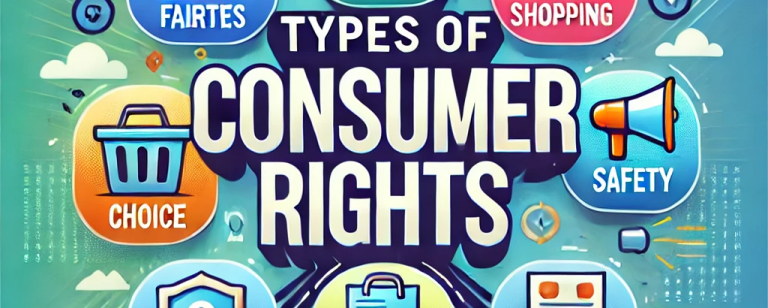Consumer rights are the backbone of a fair marketplace, in which consumers are protected against exploitation and malpractice. These rights enable consumers to exercise informed choices, hold businesses accountable, and demand justice when needed. The type of consumer rights includes multiple dimensions such as safety and information, education, and grievance redressal, creating a framework for consumer protection. This article delves into each type in detail, highlighting their importance in protecting consumer interests and building trust between businesses and buyers.
What are Consumer Rights?
Consumer rights can be described as legal entitlements bestowed on people to protect them against fraudulent trade practices, faulty products, and shoddy services. They are ensured of quality goods, truthful information, and remedies when something goes wrong. This whole concept emerged from international programs like the United Nations Guidelines for Consumer Protection, thus becoming a significant component of consumer laws across the world, as in India with the Consumer Protection Act
The core of consumer rights is that it should create a balance between sellers and buyers to avoid exploitation and increase transparency. By knowing the types of consumer Right
exercising these rights, consumers can raise their expectations and make businesses responsible.
Types of Consumer Rights
Every individual must be aware of the types of consumer rights. These rights protect different aspects of consumer transactions, which helps individuals to make informed and safe decisions.
Right to Safety
The right to safety is a basic consumer right that aims at protecting the individual from those products and services that might harm his health, safety, or well-being. In industries such as food, healthcare, and electronics, substandard or defective products can have serious consequences.
The right to safety obligates manufacturers, service providers, and sellers to adhere to established safety standards and regulations. For instance, pharmaceutical companies must conduct extensive testing before launching medicines, while automobile manufacturers are required to recall vehicles with safety defects. This right can be ensured by the governments through safety standards and checking. For instance, the food safety authorities check on a regular basis the markets in order to prevent the selling of adulterated or expired products. Consumers should also be alert and confirm the safety certifications like ISI or ISO marks and complain about the violations.
Right to Information
Informational rights guarantee consumers access to information that is accurate and complete about products and services. This includes information on price, quality, ingredients, usage instructions, and potential risks. Information transparency ensures that consumers can make informed choices and avoid being misled. Governments enforce this right through labeling laws and truth-in-advertising regulations. Businesses that fail to provide accurate information can face penalties or legal action.
Right to Choose
The right to choose means access to many goods and services, not based on influence and restriction. It simply gives consumers the choice of what they want based on preferences and needs while competition drives businesses.
This right opposes monopolistic practices where a single entity dominates the market, leaving consumers with limited or no alternatives. For example, in sectors like telecommunications or banking, competition among providers ensures better quality and pricing. Governments and regulatory bodies promote this right by dismantling monopolies and encouraging market competition.
Right to Be Heard
This means the right to be heard: that consumers can voice their grievances, opinions, and concerns regarding products and services. The right to be heard, therefore, underlines accountability and responsiveness from business and regulatory bodies.
Businesses are mandated to set up structures for receiving and dealing with consumer complaints. Among them, companies usually design customer service helplines or email support, and in-store grievance desks. Other mechanisms include consumer forums and ombudsmen, which are critical channels for ensuring that consumer views are heard. This right benefits not only individual consumers but also helps improve the overall products and services.
Right to Seek Redressal
The right to seek redressal empowers the consumer to demand compensation, refunds, or other redressals when wronged by defective products, poor services, or unfair trade practices. It is an important right to enforce accountability and ensure that businesses respect the interests of consumers. For example, if a consumer buys a faulty refrigerator, they can demand a replacement or repair under warranty. In cases of financial loss due to misleading advertisements, consumers can claim monetary compensation.
Governments have set up the structure in the form of the Consumer Protection Act, through which redressal mechanisms have been designed. Companies are further encouraged to provide internal solutions that would be swift and efficient in resolving disputes. Consumers need to keep record copies of transactions, warranty documents, and communication.
Right to Consumer Education
The right to consumer education tries to empower an individual so that he becomes capable and aware of navigating the marketplace. This right informs consumers regarding their rights and responsibilities in the marketplace, as well as the possible avenues to seek redressal. Consumer education encompasses awareness campaigns, workshops, and inclusion in educational curricula. For example, government initiatives like the “Jago Grahak Jago” campaign in India aim to educate consumers about their rights. Schools and colleges often include consumer rights as part of their syllabus to instill awareness from a young age.
Practical Tips for Consumers
In today’s dynamic marketplace, consumers face numerous choices and challenges when making purchasing decisions. Practical tips can empower consumers to make educated decisions, safeguard their finances, and maximize satisfaction from their purchases
- Always check for certifications and labels before buying: Certifications and labels ensure that the product complies with industry standards, safety norms, or quality benchmarks. For example, ISI marks for electrical appliances in India
- Demand detailed receipts and maintain them for future reference: A detailed receipt serves as proof of purchase, which is crucial for returns, exchanges, or warranty claims. Without it, consumers may face difficulties asserting their rights.
- File grievances on consumer helplines or forums without delay: Prompt filing ensures timely resolution and prevents companies from claiming ignorance or passage of the complaint window. It also helps maintain evidence of your proactive approach in resolving disputes.
Types of Consumer Rights FAQs
What is the significance of types of consumer rights?
The types of consumer rights protect individuals from exploitation, ensure fairness, and provide avenues for justice, thus building trust and confidence in the marketplace.
How can a consumer exercise the right to redressal?
Consumers can file complaints with consumer forums, seek help from ombudsmen, or directly approach companies for refunds, repairs, or compensation.
Why is the right to information significant for consumers?
It prevents deception, allows informed decision-making, and fosters a transparent relationship between businesses and consumers.
Are businesses legally bound to follow consumer rights?
Yes, laws like the Consumer Protection Act mandate businesses to respect and uphold consumer rights, ensuring accountability and fairness.
How can one promote consumer education?
By conducting workshops, incorporating consumer rights into curricula of educational institutions, and through digital awareness campaigns.


